Enterprise and Opportunities: Analysis of Teamwork and Management
VerifiedAdded on 2023/06/18
|14
|4635
|498
Report
AI Summary
This report provides an overview of enterprise and opportunities, focusing on the significance of teamwork and the implementation of management theories within an organization. It delves into the dynamics of teamwork, highlighting examples of successful teamwork, the application of Belbin's team roles, and the impact of effective communication. Furthermore, the report explores various management theories, such as scientific and bureaucratic management, and their influence on productivity and organizational structure. It also contextualizes learning and development, incorporating Kolb's Learning Cycle and Honey and Mumford's learning styles to analyze skill development and create a personal development plan. The report concludes by emphasizing the importance of contextual learning and its role in driving effective changes in skills and overall organizational growth.
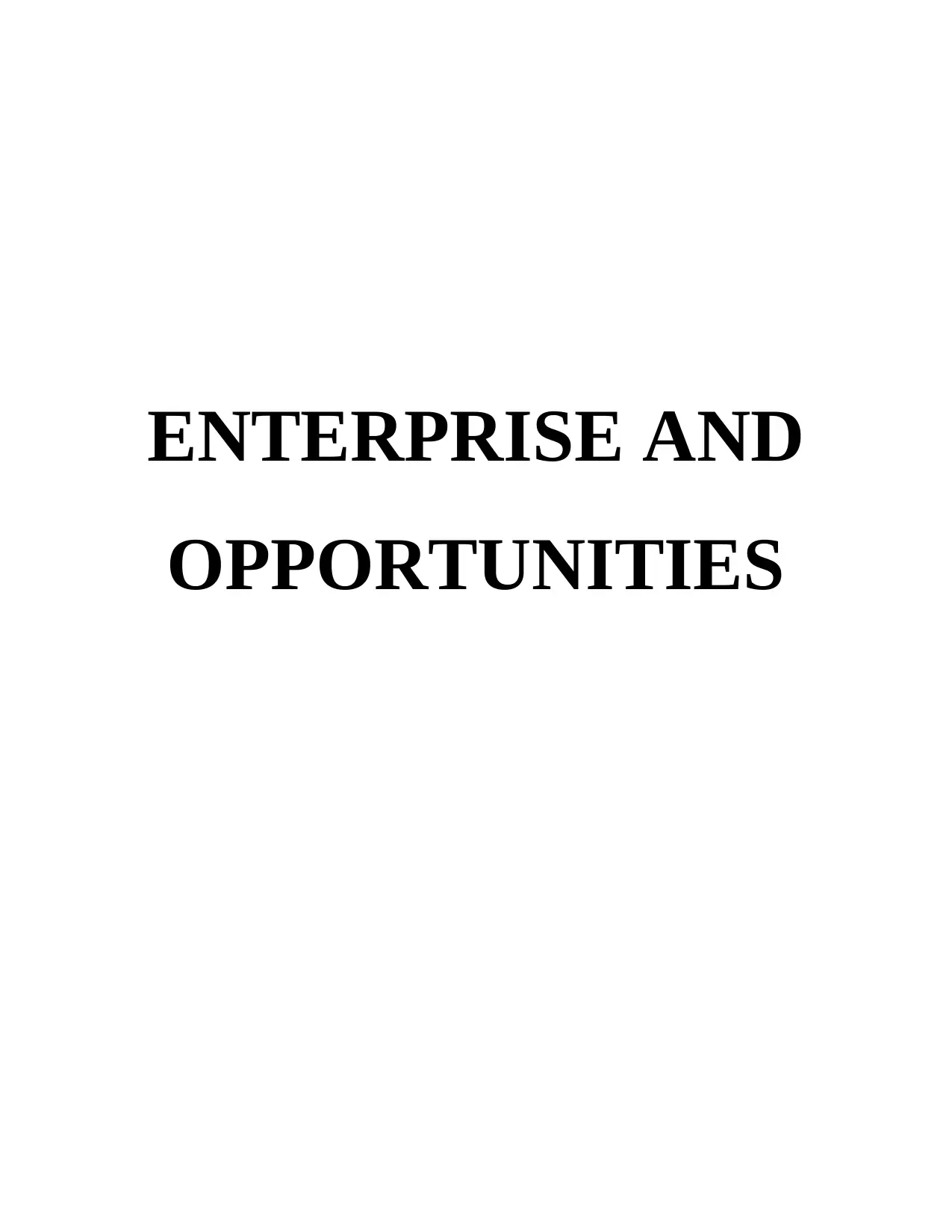
ENTERPRISE AND
OPPORTUNITIES
OPPORTUNITIES
Paraphrase This Document
Need a fresh take? Get an instant paraphrase of this document with our AI Paraphraser
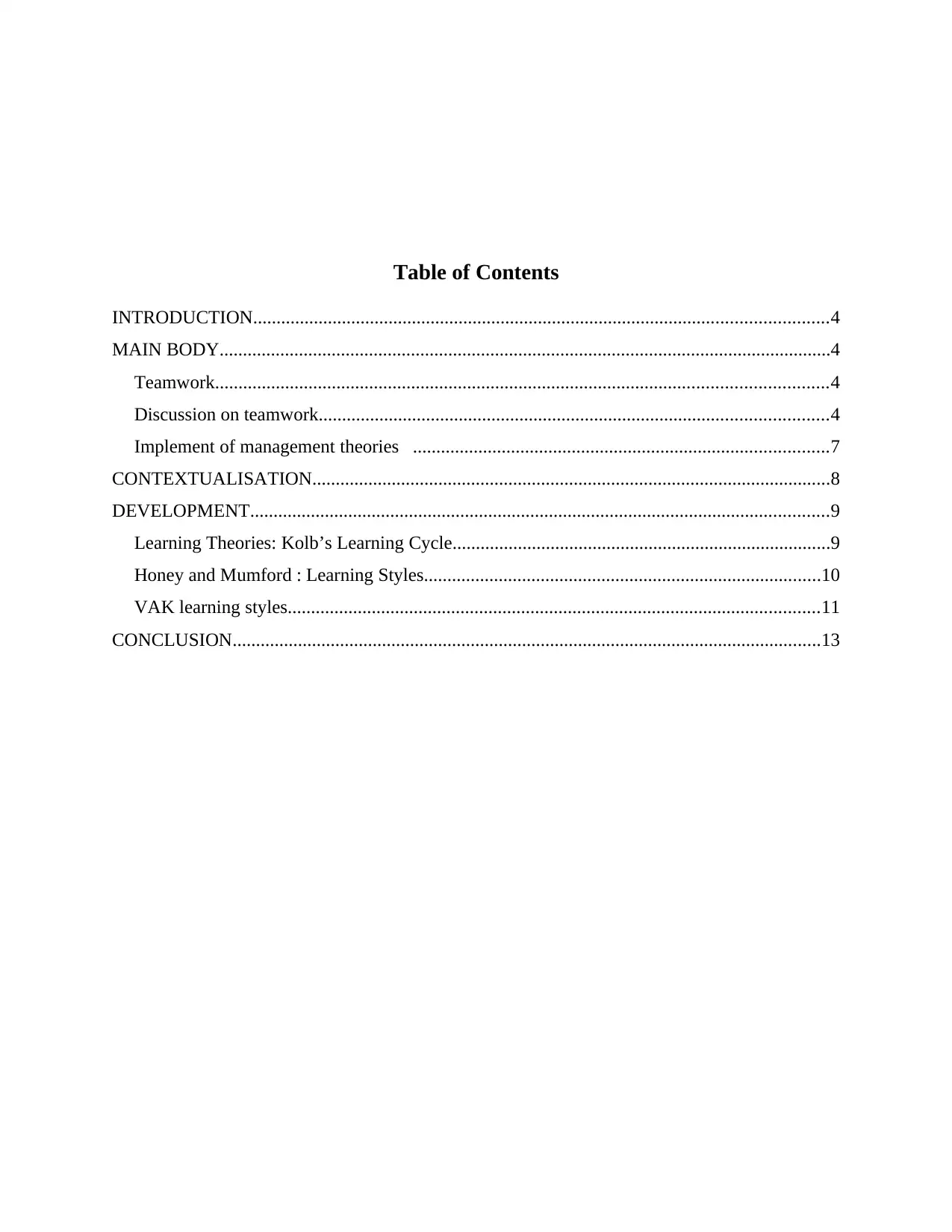
Table of Contents
INTRODUCTION...........................................................................................................................4
MAIN BODY...................................................................................................................................4
Teamwork...................................................................................................................................4
Discussion on teamwork.............................................................................................................4
Implement of management theories .........................................................................................7
CONTEXTUALISATION...............................................................................................................8
DEVELOPMENT............................................................................................................................9
Learning Theories: Kolb’s Learning Cycle.................................................................................9
Honey and Mumford : Learning Styles.....................................................................................10
VAK learning styles..................................................................................................................11
CONCLUSION..............................................................................................................................13
INTRODUCTION...........................................................................................................................4
MAIN BODY...................................................................................................................................4
Teamwork...................................................................................................................................4
Discussion on teamwork.............................................................................................................4
Implement of management theories .........................................................................................7
CONTEXTUALISATION...............................................................................................................8
DEVELOPMENT............................................................................................................................9
Learning Theories: Kolb’s Learning Cycle.................................................................................9
Honey and Mumford : Learning Styles.....................................................................................10
VAK learning styles..................................................................................................................11
CONCLUSION..............................................................................................................................13
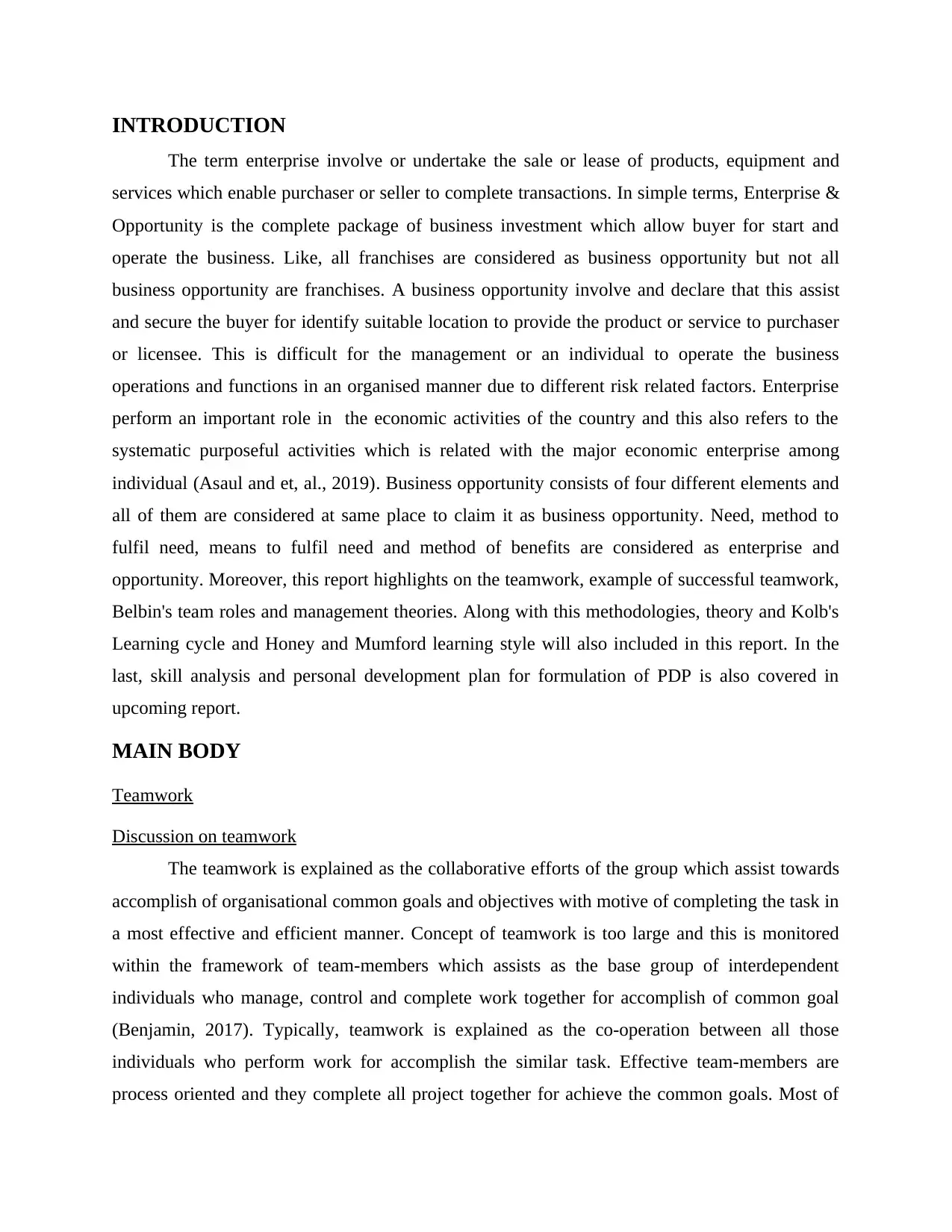
INTRODUCTION
The term enterprise involve or undertake the sale or lease of products, equipment and
services which enable purchaser or seller to complete transactions. In simple terms, Enterprise &
Opportunity is the complete package of business investment which allow buyer for start and
operate the business. Like, all franchises are considered as business opportunity but not all
business opportunity are franchises. A business opportunity involve and declare that this assist
and secure the buyer for identify suitable location to provide the product or service to purchaser
or licensee. This is difficult for the management or an individual to operate the business
operations and functions in an organised manner due to different risk related factors. Enterprise
perform an important role in the economic activities of the country and this also refers to the
systematic purposeful activities which is related with the major economic enterprise among
individual (Asaul and et, al., 2019). Business opportunity consists of four different elements and
all of them are considered at same place to claim it as business opportunity. Need, method to
fulfil need, means to fulfil need and method of benefits are considered as enterprise and
opportunity. Moreover, this report highlights on the teamwork, example of successful teamwork,
Belbin's team roles and management theories. Along with this methodologies, theory and Kolb's
Learning cycle and Honey and Mumford learning style will also included in this report. In the
last, skill analysis and personal development plan for formulation of PDP is also covered in
upcoming report.
MAIN BODY
Teamwork
Discussion on teamwork
The teamwork is explained as the collaborative efforts of the group which assist towards
accomplish of organisational common goals and objectives with motive of completing the task in
a most effective and efficient manner. Concept of teamwork is too large and this is monitored
within the framework of team-members which assists as the base group of interdependent
individuals who manage, control and complete work together for accomplish of common goal
(Benjamin, 2017). Typically, teamwork is explained as the co-operation between all those
individuals who perform work for accomplish the similar task. Effective team-members are
process oriented and they complete all project together for achieve the common goals. Most of
The term enterprise involve or undertake the sale or lease of products, equipment and
services which enable purchaser or seller to complete transactions. In simple terms, Enterprise &
Opportunity is the complete package of business investment which allow buyer for start and
operate the business. Like, all franchises are considered as business opportunity but not all
business opportunity are franchises. A business opportunity involve and declare that this assist
and secure the buyer for identify suitable location to provide the product or service to purchaser
or licensee. This is difficult for the management or an individual to operate the business
operations and functions in an organised manner due to different risk related factors. Enterprise
perform an important role in the economic activities of the country and this also refers to the
systematic purposeful activities which is related with the major economic enterprise among
individual (Asaul and et, al., 2019). Business opportunity consists of four different elements and
all of them are considered at same place to claim it as business opportunity. Need, method to
fulfil need, means to fulfil need and method of benefits are considered as enterprise and
opportunity. Moreover, this report highlights on the teamwork, example of successful teamwork,
Belbin's team roles and management theories. Along with this methodologies, theory and Kolb's
Learning cycle and Honey and Mumford learning style will also included in this report. In the
last, skill analysis and personal development plan for formulation of PDP is also covered in
upcoming report.
MAIN BODY
Teamwork
Discussion on teamwork
The teamwork is explained as the collaborative efforts of the group which assist towards
accomplish of organisational common goals and objectives with motive of completing the task in
a most effective and efficient manner. Concept of teamwork is too large and this is monitored
within the framework of team-members which assists as the base group of interdependent
individuals who manage, control and complete work together for accomplish of common goal
(Benjamin, 2017). Typically, teamwork is explained as the co-operation between all those
individuals who perform work for accomplish the similar task. Effective team-members are
process oriented and they complete all project together for achieve the common goals. Most of
⊘ This is a preview!⊘
Do you want full access?
Subscribe today to unlock all pages.

Trusted by 1+ million students worldwide
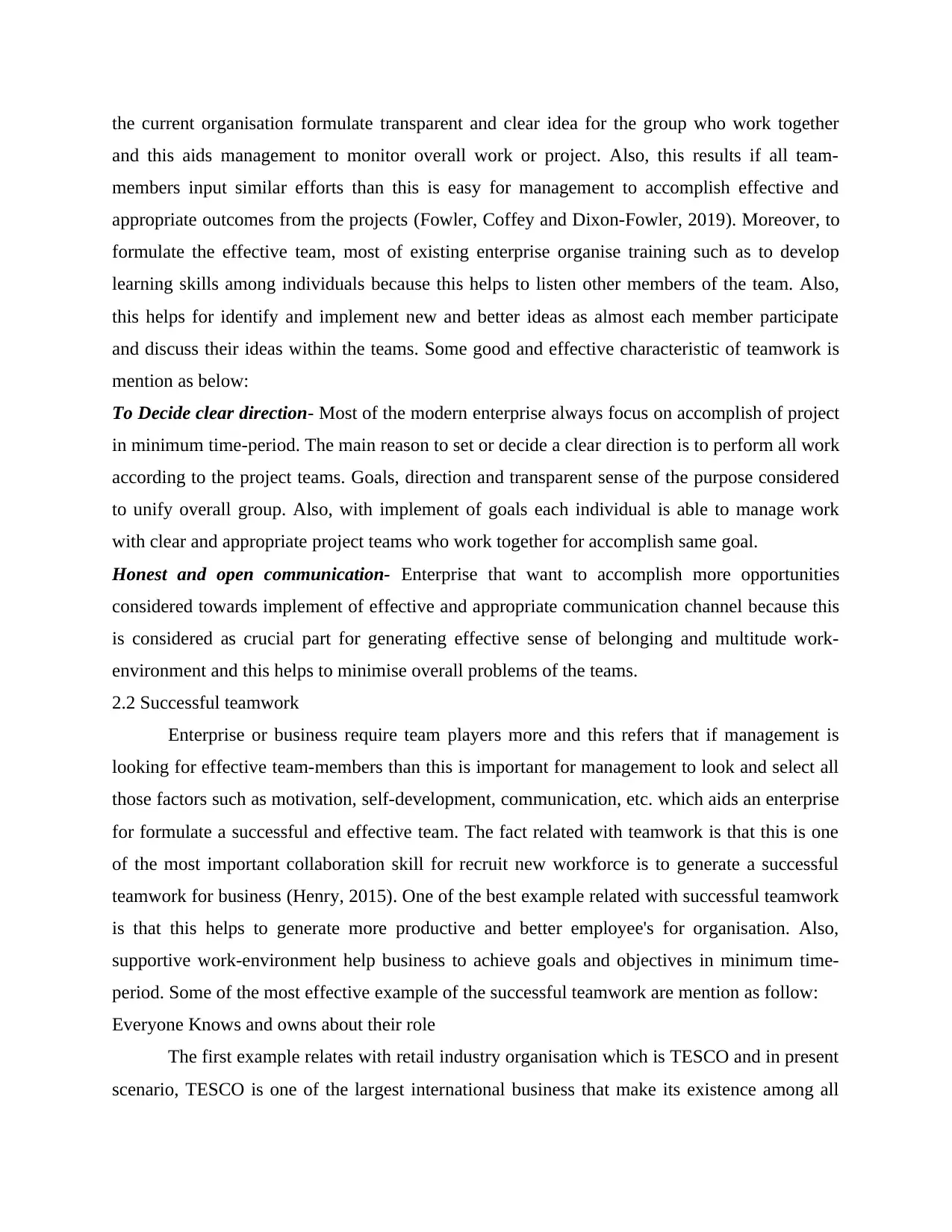
the current organisation formulate transparent and clear idea for the group who work together
and this aids management to monitor overall work or project. Also, this results if all team-
members input similar efforts than this is easy for management to accomplish effective and
appropriate outcomes from the projects (Fowler, Coffey and Dixon-Fowler, 2019). Moreover, to
formulate the effective team, most of existing enterprise organise training such as to develop
learning skills among individuals because this helps to listen other members of the team. Also,
this helps for identify and implement new and better ideas as almost each member participate
and discuss their ideas within the teams. Some good and effective characteristic of teamwork is
mention as below:
To Decide clear direction- Most of the modern enterprise always focus on accomplish of project
in minimum time-period. The main reason to set or decide a clear direction is to perform all work
according to the project teams. Goals, direction and transparent sense of the purpose considered
to unify overall group. Also, with implement of goals each individual is able to manage work
with clear and appropriate project teams who work together for accomplish same goal.
Honest and open communication- Enterprise that want to accomplish more opportunities
considered towards implement of effective and appropriate communication channel because this
is considered as crucial part for generating effective sense of belonging and multitude work-
environment and this helps to minimise overall problems of the teams.
2.2 Successful teamwork
Enterprise or business require team players more and this refers that if management is
looking for effective team-members than this is important for management to look and select all
those factors such as motivation, self-development, communication, etc. which aids an enterprise
for formulate a successful and effective team. The fact related with teamwork is that this is one
of the most important collaboration skill for recruit new workforce is to generate a successful
teamwork for business (Henry, 2015). One of the best example related with successful teamwork
is that this helps to generate more productive and better employee's for organisation. Also,
supportive work-environment help business to achieve goals and objectives in minimum time-
period. Some of the most effective example of the successful teamwork are mention as follow:
Everyone Knows and owns about their role
The first example relates with retail industry organisation which is TESCO and in present
scenario, TESCO is one of the largest international business that make its existence among all
and this aids management to monitor overall work or project. Also, this results if all team-
members input similar efforts than this is easy for management to accomplish effective and
appropriate outcomes from the projects (Fowler, Coffey and Dixon-Fowler, 2019). Moreover, to
formulate the effective team, most of existing enterprise organise training such as to develop
learning skills among individuals because this helps to listen other members of the team. Also,
this helps for identify and implement new and better ideas as almost each member participate
and discuss their ideas within the teams. Some good and effective characteristic of teamwork is
mention as below:
To Decide clear direction- Most of the modern enterprise always focus on accomplish of project
in minimum time-period. The main reason to set or decide a clear direction is to perform all work
according to the project teams. Goals, direction and transparent sense of the purpose considered
to unify overall group. Also, with implement of goals each individual is able to manage work
with clear and appropriate project teams who work together for accomplish same goal.
Honest and open communication- Enterprise that want to accomplish more opportunities
considered towards implement of effective and appropriate communication channel because this
is considered as crucial part for generating effective sense of belonging and multitude work-
environment and this helps to minimise overall problems of the teams.
2.2 Successful teamwork
Enterprise or business require team players more and this refers that if management is
looking for effective team-members than this is important for management to look and select all
those factors such as motivation, self-development, communication, etc. which aids an enterprise
for formulate a successful and effective team. The fact related with teamwork is that this is one
of the most important collaboration skill for recruit new workforce is to generate a successful
teamwork for business (Henry, 2015). One of the best example related with successful teamwork
is that this helps to generate more productive and better employee's for organisation. Also,
supportive work-environment help business to achieve goals and objectives in minimum time-
period. Some of the most effective example of the successful teamwork are mention as follow:
Everyone Knows and owns about their role
The first example relates with retail industry organisation which is TESCO and in present
scenario, TESCO is one of the largest international business that make its existence among all
Paraphrase This Document
Need a fresh take? Get an instant paraphrase of this document with our AI Paraphraser
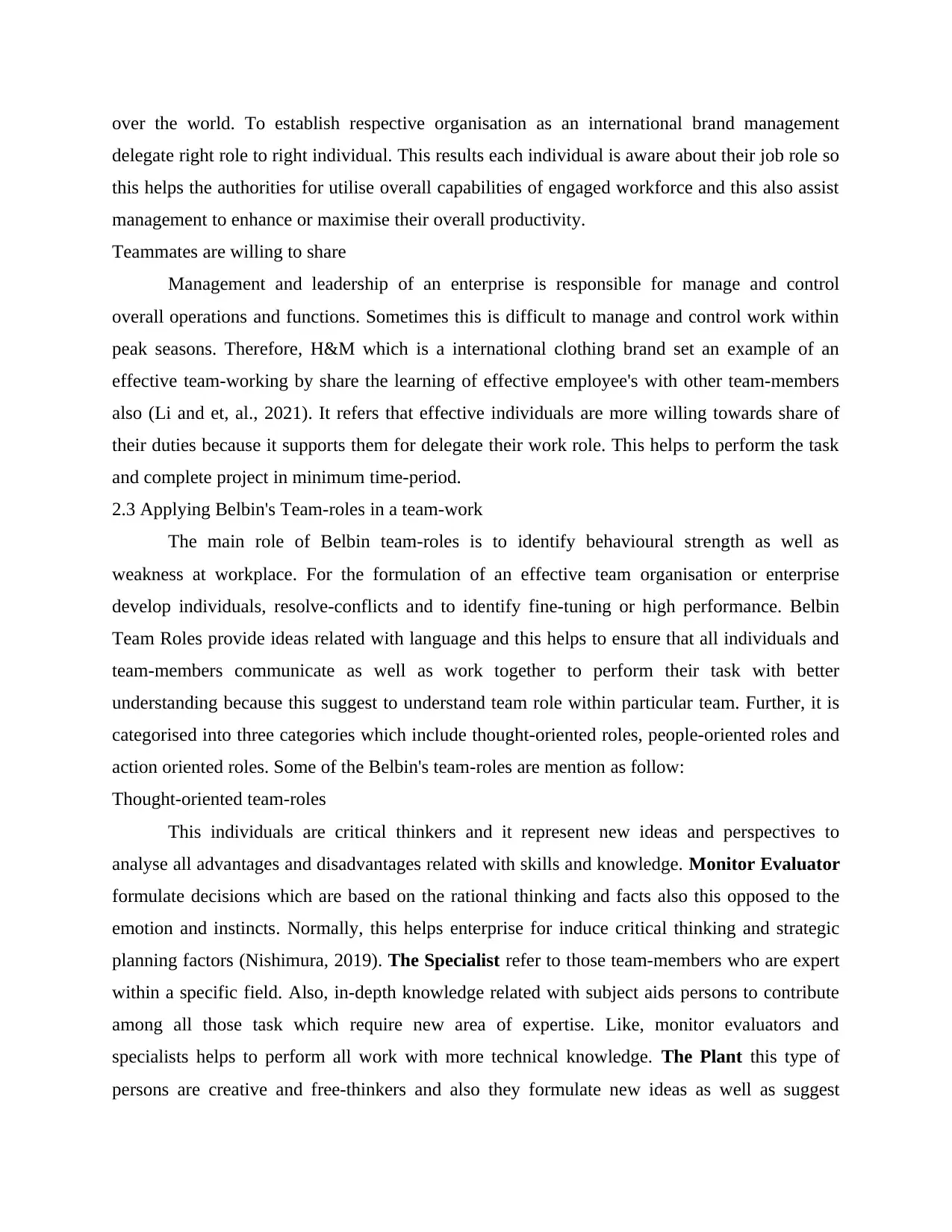
over the world. To establish respective organisation as an international brand management
delegate right role to right individual. This results each individual is aware about their job role so
this helps the authorities for utilise overall capabilities of engaged workforce and this also assist
management to enhance or maximise their overall productivity.
Teammates are willing to share
Management and leadership of an enterprise is responsible for manage and control
overall operations and functions. Sometimes this is difficult to manage and control work within
peak seasons. Therefore, H&M which is a international clothing brand set an example of an
effective team-working by share the learning of effective employee's with other team-members
also (Li and et, al., 2021). It refers that effective individuals are more willing towards share of
their duties because it supports them for delegate their work role. This helps to perform the task
and complete project in minimum time-period.
2.3 Applying Belbin's Team-roles in a team-work
The main role of Belbin team-roles is to identify behavioural strength as well as
weakness at workplace. For the formulation of an effective team organisation or enterprise
develop individuals, resolve-conflicts and to identify fine-tuning or high performance. Belbin
Team Roles provide ideas related with language and this helps to ensure that all individuals and
team-members communicate as well as work together to perform their task with better
understanding because this suggest to understand team role within particular team. Further, it is
categorised into three categories which include thought-oriented roles, people-oriented roles and
action oriented roles. Some of the Belbin's team-roles are mention as follow:
Thought-oriented team-roles
This individuals are critical thinkers and it represent new ideas and perspectives to
analyse all advantages and disadvantages related with skills and knowledge. Monitor Evaluator
formulate decisions which are based on the rational thinking and facts also this opposed to the
emotion and instincts. Normally, this helps enterprise for induce critical thinking and strategic
planning factors (Nishimura, 2019). The Specialist refer to those team-members who are expert
within a specific field. Also, in-depth knowledge related with subject aids persons to contribute
among all those task which require new area of expertise. Like, monitor evaluators and
specialists helps to perform all work with more technical knowledge. The Plant this type of
persons are creative and free-thinkers and also they formulate new ideas as well as suggest
delegate right role to right individual. This results each individual is aware about their job role so
this helps the authorities for utilise overall capabilities of engaged workforce and this also assist
management to enhance or maximise their overall productivity.
Teammates are willing to share
Management and leadership of an enterprise is responsible for manage and control
overall operations and functions. Sometimes this is difficult to manage and control work within
peak seasons. Therefore, H&M which is a international clothing brand set an example of an
effective team-working by share the learning of effective employee's with other team-members
also (Li and et, al., 2021). It refers that effective individuals are more willing towards share of
their duties because it supports them for delegate their work role. This helps to perform the task
and complete project in minimum time-period.
2.3 Applying Belbin's Team-roles in a team-work
The main role of Belbin team-roles is to identify behavioural strength as well as
weakness at workplace. For the formulation of an effective team organisation or enterprise
develop individuals, resolve-conflicts and to identify fine-tuning or high performance. Belbin
Team Roles provide ideas related with language and this helps to ensure that all individuals and
team-members communicate as well as work together to perform their task with better
understanding because this suggest to understand team role within particular team. Further, it is
categorised into three categories which include thought-oriented roles, people-oriented roles and
action oriented roles. Some of the Belbin's team-roles are mention as follow:
Thought-oriented team-roles
This individuals are critical thinkers and it represent new ideas and perspectives to
analyse all advantages and disadvantages related with skills and knowledge. Monitor Evaluator
formulate decisions which are based on the rational thinking and facts also this opposed to the
emotion and instincts. Normally, this helps enterprise for induce critical thinking and strategic
planning factors (Nishimura, 2019). The Specialist refer to those team-members who are expert
within a specific field. Also, in-depth knowledge related with subject aids persons to contribute
among all those task which require new area of expertise. Like, monitor evaluators and
specialists helps to perform all work with more technical knowledge. The Plant this type of
persons are creative and free-thinkers and also they formulate new ideas as well as suggest
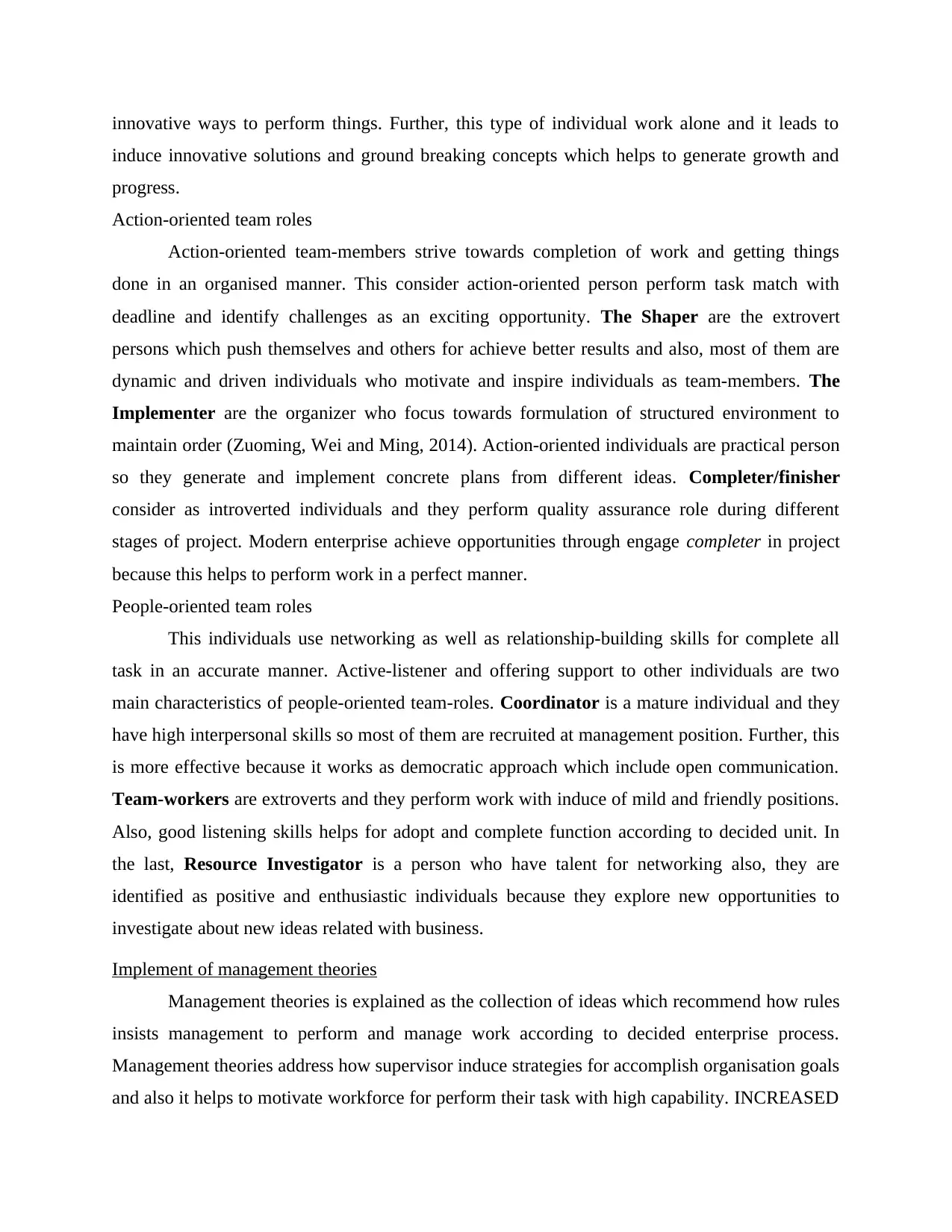
innovative ways to perform things. Further, this type of individual work alone and it leads to
induce innovative solutions and ground breaking concepts which helps to generate growth and
progress.
Action-oriented team roles
Action-oriented team-members strive towards completion of work and getting things
done in an organised manner. This consider action-oriented person perform task match with
deadline and identify challenges as an exciting opportunity. The Shaper are the extrovert
persons which push themselves and others for achieve better results and also, most of them are
dynamic and driven individuals who motivate and inspire individuals as team-members. The
Implementer are the organizer who focus towards formulation of structured environment to
maintain order (Zuoming, Wei and Ming, 2014). Action-oriented individuals are practical person
so they generate and implement concrete plans from different ideas. Completer/finisher
consider as introverted individuals and they perform quality assurance role during different
stages of project. Modern enterprise achieve opportunities through engage completer in project
because this helps to perform work in a perfect manner.
People-oriented team roles
This individuals use networking as well as relationship-building skills for complete all
task in an accurate manner. Active-listener and offering support to other individuals are two
main characteristics of people-oriented team-roles. Coordinator is a mature individual and they
have high interpersonal skills so most of them are recruited at management position. Further, this
is more effective because it works as democratic approach which include open communication.
Team-workers are extroverts and they perform work with induce of mild and friendly positions.
Also, good listening skills helps for adopt and complete function according to decided unit. In
the last, Resource Investigator is a person who have talent for networking also, they are
identified as positive and enthusiastic individuals because they explore new opportunities to
investigate about new ideas related with business.
Implement of management theories
Management theories is explained as the collection of ideas which recommend how rules
insists management to perform and manage work according to decided enterprise process.
Management theories address how supervisor induce strategies for accomplish organisation goals
and also it helps to motivate workforce for perform their task with high capability. INCREASED
induce innovative solutions and ground breaking concepts which helps to generate growth and
progress.
Action-oriented team roles
Action-oriented team-members strive towards completion of work and getting things
done in an organised manner. This consider action-oriented person perform task match with
deadline and identify challenges as an exciting opportunity. The Shaper are the extrovert
persons which push themselves and others for achieve better results and also, most of them are
dynamic and driven individuals who motivate and inspire individuals as team-members. The
Implementer are the organizer who focus towards formulation of structured environment to
maintain order (Zuoming, Wei and Ming, 2014). Action-oriented individuals are practical person
so they generate and implement concrete plans from different ideas. Completer/finisher
consider as introverted individuals and they perform quality assurance role during different
stages of project. Modern enterprise achieve opportunities through engage completer in project
because this helps to perform work in a perfect manner.
People-oriented team roles
This individuals use networking as well as relationship-building skills for complete all
task in an accurate manner. Active-listener and offering support to other individuals are two
main characteristics of people-oriented team-roles. Coordinator is a mature individual and they
have high interpersonal skills so most of them are recruited at management position. Further, this
is more effective because it works as democratic approach which include open communication.
Team-workers are extroverts and they perform work with induce of mild and friendly positions.
Also, good listening skills helps for adopt and complete function according to decided unit. In
the last, Resource Investigator is a person who have talent for networking also, they are
identified as positive and enthusiastic individuals because they explore new opportunities to
investigate about new ideas related with business.
Implement of management theories
Management theories is explained as the collection of ideas which recommend how rules
insists management to perform and manage work according to decided enterprise process.
Management theories address how supervisor induce strategies for accomplish organisation goals
and also it helps to motivate workforce for perform their task with high capability. INCREASED
⊘ This is a preview!⊘
Do you want full access?
Subscribe today to unlock all pages.

Trusted by 1+ million students worldwide
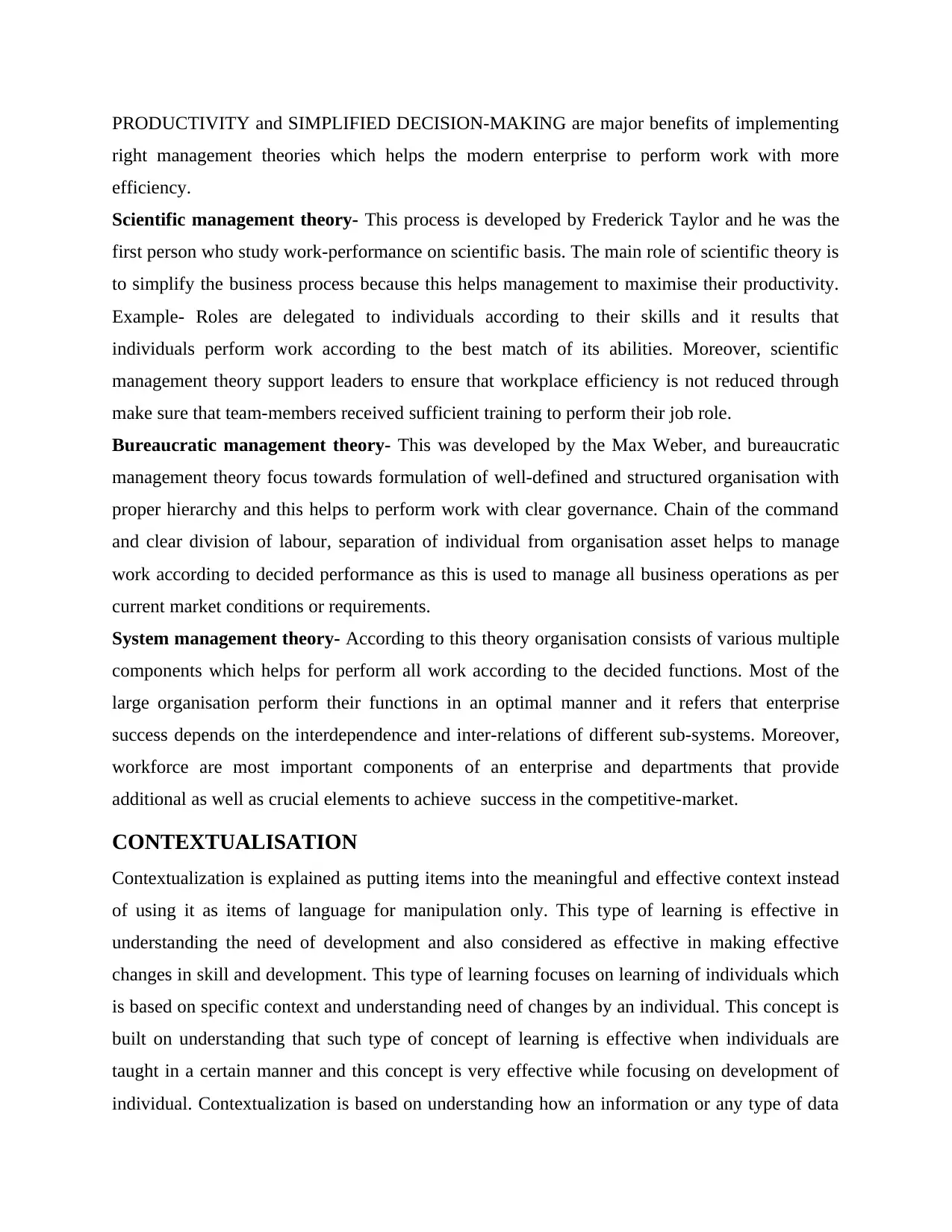
PRODUCTIVITY and SIMPLIFIED DECISION-MAKING are major benefits of implementing
right management theories which helps the modern enterprise to perform work with more
efficiency.
Scientific management theory- This process is developed by Frederick Taylor and he was the
first person who study work-performance on scientific basis. The main role of scientific theory is
to simplify the business process because this helps management to maximise their productivity.
Example- Roles are delegated to individuals according to their skills and it results that
individuals perform work according to the best match of its abilities. Moreover, scientific
management theory support leaders to ensure that workplace efficiency is not reduced through
make sure that team-members received sufficient training to perform their job role.
Bureaucratic management theory- This was developed by the Max Weber, and bureaucratic
management theory focus towards formulation of well-defined and structured organisation with
proper hierarchy and this helps to perform work with clear governance. Chain of the command
and clear division of labour, separation of individual from organisation asset helps to manage
work according to decided performance as this is used to manage all business operations as per
current market conditions or requirements.
System management theory- According to this theory organisation consists of various multiple
components which helps for perform all work according to the decided functions. Most of the
large organisation perform their functions in an optimal manner and it refers that enterprise
success depends on the interdependence and inter-relations of different sub-systems. Moreover,
workforce are most important components of an enterprise and departments that provide
additional as well as crucial elements to achieve success in the competitive-market.
CONTEXTUALISATION
Contextualization is explained as putting items into the meaningful and effective context instead
of using it as items of language for manipulation only. This type of learning is effective in
understanding the need of development and also considered as effective in making effective
changes in skill and development. This type of learning focuses on learning of individuals which
is based on specific context and understanding need of changes by an individual. This concept is
built on understanding that such type of concept of learning is effective when individuals are
taught in a certain manner and this concept is very effective while focusing on development of
individual. Contextualization is based on understanding how an information or any type of data
right management theories which helps the modern enterprise to perform work with more
efficiency.
Scientific management theory- This process is developed by Frederick Taylor and he was the
first person who study work-performance on scientific basis. The main role of scientific theory is
to simplify the business process because this helps management to maximise their productivity.
Example- Roles are delegated to individuals according to their skills and it results that
individuals perform work according to the best match of its abilities. Moreover, scientific
management theory support leaders to ensure that workplace efficiency is not reduced through
make sure that team-members received sufficient training to perform their job role.
Bureaucratic management theory- This was developed by the Max Weber, and bureaucratic
management theory focus towards formulation of well-defined and structured organisation with
proper hierarchy and this helps to perform work with clear governance. Chain of the command
and clear division of labour, separation of individual from organisation asset helps to manage
work according to decided performance as this is used to manage all business operations as per
current market conditions or requirements.
System management theory- According to this theory organisation consists of various multiple
components which helps for perform all work according to the decided functions. Most of the
large organisation perform their functions in an optimal manner and it refers that enterprise
success depends on the interdependence and inter-relations of different sub-systems. Moreover,
workforce are most important components of an enterprise and departments that provide
additional as well as crucial elements to achieve success in the competitive-market.
CONTEXTUALISATION
Contextualization is explained as putting items into the meaningful and effective context instead
of using it as items of language for manipulation only. This type of learning is effective in
understanding the need of development and also considered as effective in making effective
changes in skill and development. This type of learning focuses on learning of individuals which
is based on specific context and understanding need of changes by an individual. This concept is
built on understanding that such type of concept of learning is effective when individuals are
taught in a certain manner and this concept is very effective while focusing on development of
individual. Contextualization is based on understanding how an information or any type of data
Paraphrase This Document
Need a fresh take? Get an instant paraphrase of this document with our AI Paraphraser
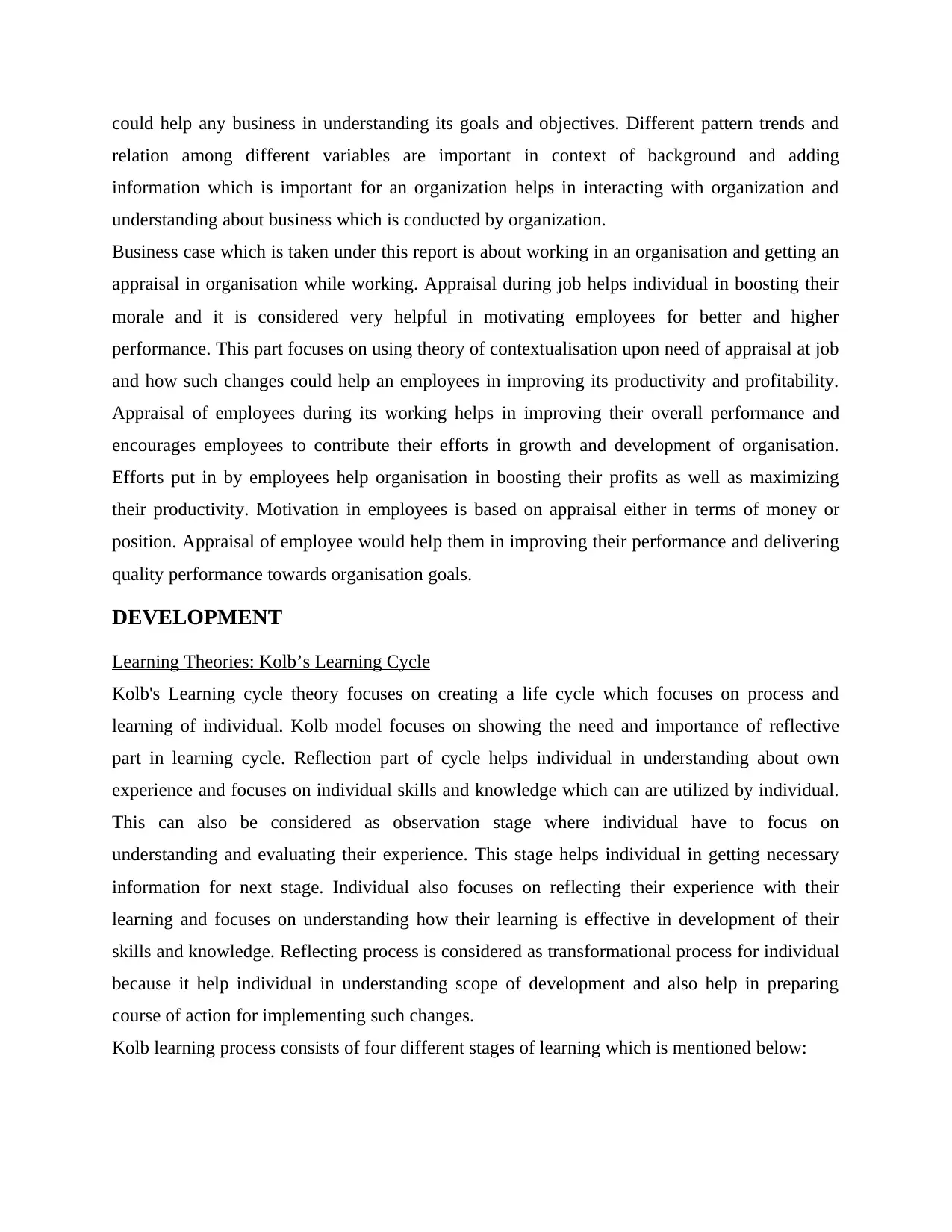
could help any business in understanding its goals and objectives. Different pattern trends and
relation among different variables are important in context of background and adding
information which is important for an organization helps in interacting with organization and
understanding about business which is conducted by organization.
Business case which is taken under this report is about working in an organisation and getting an
appraisal in organisation while working. Appraisal during job helps individual in boosting their
morale and it is considered very helpful in motivating employees for better and higher
performance. This part focuses on using theory of contextualisation upon need of appraisal at job
and how such changes could help an employees in improving its productivity and profitability.
Appraisal of employees during its working helps in improving their overall performance and
encourages employees to contribute their efforts in growth and development of organisation.
Efforts put in by employees help organisation in boosting their profits as well as maximizing
their productivity. Motivation in employees is based on appraisal either in terms of money or
position. Appraisal of employee would help them in improving their performance and delivering
quality performance towards organisation goals.
DEVELOPMENT
Learning Theories: Kolb’s Learning Cycle
Kolb's Learning cycle theory focuses on creating a life cycle which focuses on process and
learning of individual. Kolb model focuses on showing the need and importance of reflective
part in learning cycle. Reflection part of cycle helps individual in understanding about own
experience and focuses on individual skills and knowledge which can are utilized by individual.
This can also be considered as observation stage where individual have to focus on
understanding and evaluating their experience. This stage helps individual in getting necessary
information for next stage. Individual also focuses on reflecting their experience with their
learning and focuses on understanding how their learning is effective in development of their
skills and knowledge. Reflecting process is considered as transformational process for individual
because it help individual in understanding scope of development and also help in preparing
course of action for implementing such changes.
Kolb learning process consists of four different stages of learning which is mentioned below:
relation among different variables are important in context of background and adding
information which is important for an organization helps in interacting with organization and
understanding about business which is conducted by organization.
Business case which is taken under this report is about working in an organisation and getting an
appraisal in organisation while working. Appraisal during job helps individual in boosting their
morale and it is considered very helpful in motivating employees for better and higher
performance. This part focuses on using theory of contextualisation upon need of appraisal at job
and how such changes could help an employees in improving its productivity and profitability.
Appraisal of employees during its working helps in improving their overall performance and
encourages employees to contribute their efforts in growth and development of organisation.
Efforts put in by employees help organisation in boosting their profits as well as maximizing
their productivity. Motivation in employees is based on appraisal either in terms of money or
position. Appraisal of employee would help them in improving their performance and delivering
quality performance towards organisation goals.
DEVELOPMENT
Learning Theories: Kolb’s Learning Cycle
Kolb's Learning cycle theory focuses on creating a life cycle which focuses on process and
learning of individual. Kolb model focuses on showing the need and importance of reflective
part in learning cycle. Reflection part of cycle helps individual in understanding about own
experience and focuses on individual skills and knowledge which can are utilized by individual.
This can also be considered as observation stage where individual have to focus on
understanding and evaluating their experience. This stage helps individual in getting necessary
information for next stage. Individual also focuses on reflecting their experience with their
learning and focuses on understanding how their learning is effective in development of their
skills and knowledge. Reflecting process is considered as transformational process for individual
because it help individual in understanding scope of development and also help in preparing
course of action for implementing such changes.
Kolb learning process consists of four different stages of learning which is mentioned below:
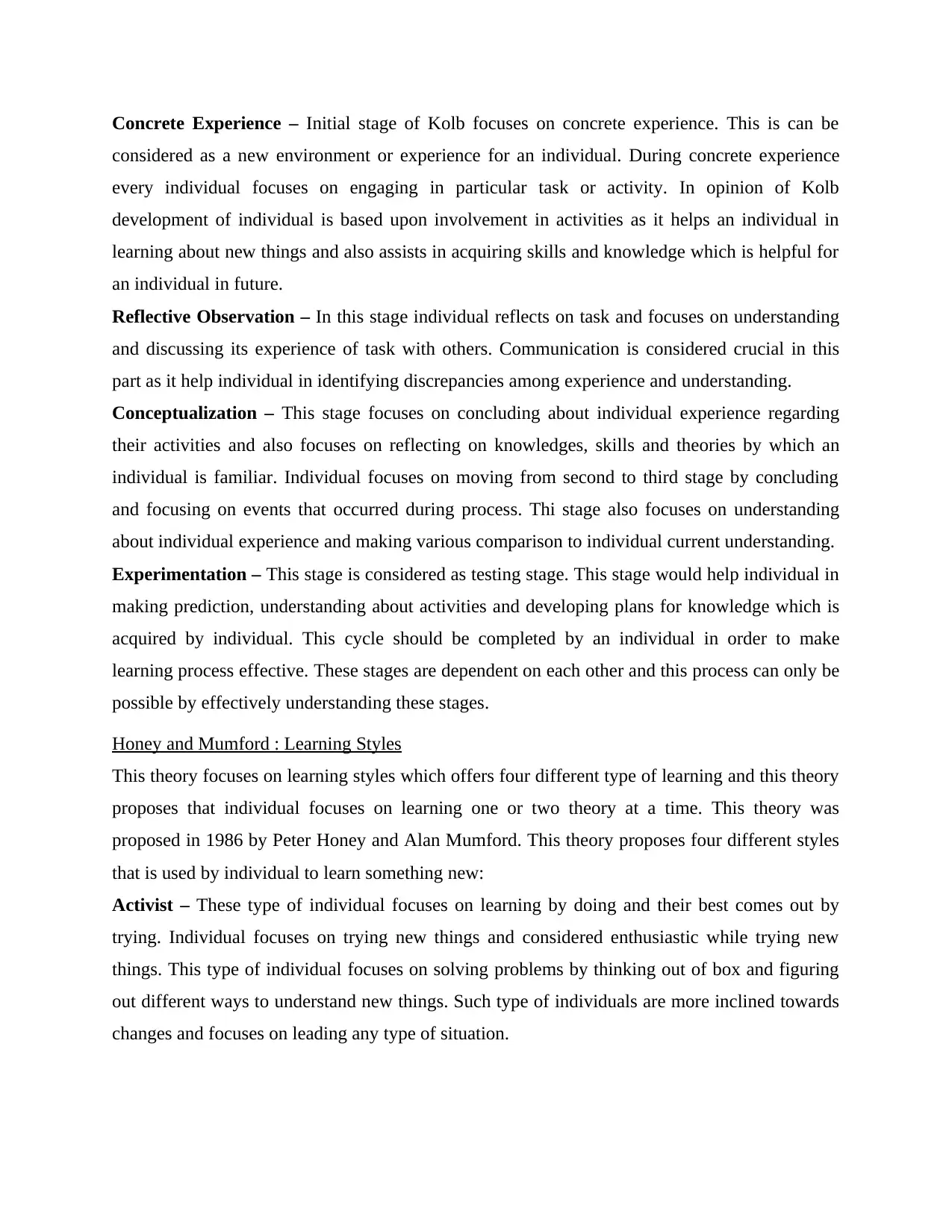
Concrete Experience – Initial stage of Kolb focuses on concrete experience. This is can be
considered as a new environment or experience for an individual. During concrete experience
every individual focuses on engaging in particular task or activity. In opinion of Kolb
development of individual is based upon involvement in activities as it helps an individual in
learning about new things and also assists in acquiring skills and knowledge which is helpful for
an individual in future.
Reflective Observation – In this stage individual reflects on task and focuses on understanding
and discussing its experience of task with others. Communication is considered crucial in this
part as it help individual in identifying discrepancies among experience and understanding.
Conceptualization – This stage focuses on concluding about individual experience regarding
their activities and also focuses on reflecting on knowledges, skills and theories by which an
individual is familiar. Individual focuses on moving from second to third stage by concluding
and focusing on events that occurred during process. Thi stage also focuses on understanding
about individual experience and making various comparison to individual current understanding.
Experimentation – This stage is considered as testing stage. This stage would help individual in
making prediction, understanding about activities and developing plans for knowledge which is
acquired by individual. This cycle should be completed by an individual in order to make
learning process effective. These stages are dependent on each other and this process can only be
possible by effectively understanding these stages.
Honey and Mumford : Learning Styles
This theory focuses on learning styles which offers four different type of learning and this theory
proposes that individual focuses on learning one or two theory at a time. This theory was
proposed in 1986 by Peter Honey and Alan Mumford. This theory proposes four different styles
that is used by individual to learn something new:
Activist – These type of individual focuses on learning by doing and their best comes out by
trying. Individual focuses on trying new things and considered enthusiastic while trying new
things. This type of individual focuses on solving problems by thinking out of box and figuring
out different ways to understand new things. Such type of individuals are more inclined towards
changes and focuses on leading any type of situation.
considered as a new environment or experience for an individual. During concrete experience
every individual focuses on engaging in particular task or activity. In opinion of Kolb
development of individual is based upon involvement in activities as it helps an individual in
learning about new things and also assists in acquiring skills and knowledge which is helpful for
an individual in future.
Reflective Observation – In this stage individual reflects on task and focuses on understanding
and discussing its experience of task with others. Communication is considered crucial in this
part as it help individual in identifying discrepancies among experience and understanding.
Conceptualization – This stage focuses on concluding about individual experience regarding
their activities and also focuses on reflecting on knowledges, skills and theories by which an
individual is familiar. Individual focuses on moving from second to third stage by concluding
and focusing on events that occurred during process. Thi stage also focuses on understanding
about individual experience and making various comparison to individual current understanding.
Experimentation – This stage is considered as testing stage. This stage would help individual in
making prediction, understanding about activities and developing plans for knowledge which is
acquired by individual. This cycle should be completed by an individual in order to make
learning process effective. These stages are dependent on each other and this process can only be
possible by effectively understanding these stages.
Honey and Mumford : Learning Styles
This theory focuses on learning styles which offers four different type of learning and this theory
proposes that individual focuses on learning one or two theory at a time. This theory was
proposed in 1986 by Peter Honey and Alan Mumford. This theory proposes four different styles
that is used by individual to learn something new:
Activist – These type of individual focuses on learning by doing and their best comes out by
trying. Individual focuses on trying new things and considered enthusiastic while trying new
things. This type of individual focuses on solving problems by thinking out of box and figuring
out different ways to understand new things. Such type of individuals are more inclined towards
changes and focuses on leading any type of situation.
⊘ This is a preview!⊘
Do you want full access?
Subscribe today to unlock all pages.

Trusted by 1+ million students worldwide
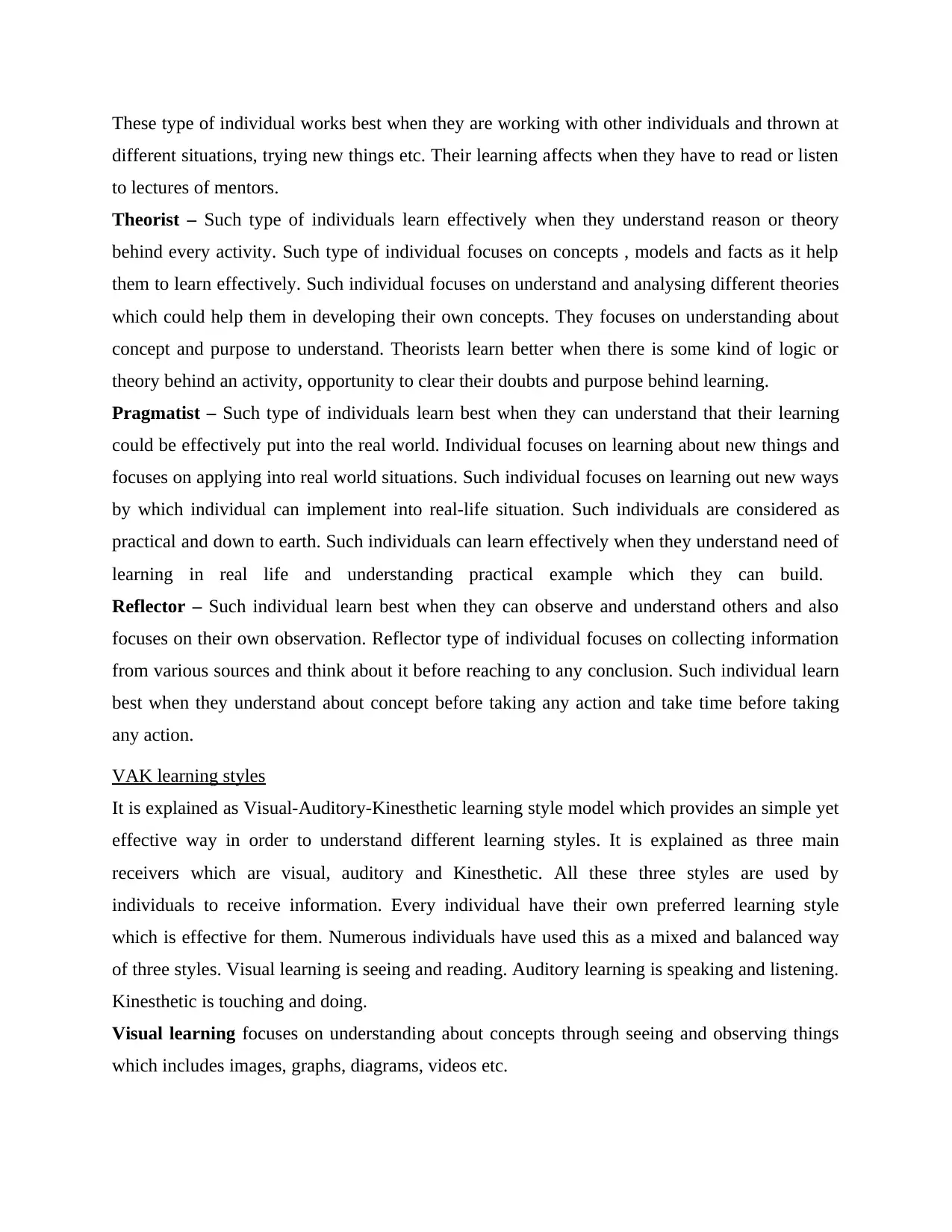
These type of individual works best when they are working with other individuals and thrown at
different situations, trying new things etc. Their learning affects when they have to read or listen
to lectures of mentors.
Theorist – Such type of individuals learn effectively when they understand reason or theory
behind every activity. Such type of individual focuses on concepts , models and facts as it help
them to learn effectively. Such individual focuses on understand and analysing different theories
which could help them in developing their own concepts. They focuses on understanding about
concept and purpose to understand. Theorists learn better when there is some kind of logic or
theory behind an activity, opportunity to clear their doubts and purpose behind learning.
Pragmatist – Such type of individuals learn best when they can understand that their learning
could be effectively put into the real world. Individual focuses on learning about new things and
focuses on applying into real world situations. Such individual focuses on learning out new ways
by which individual can implement into real-life situation. Such individuals are considered as
practical and down to earth. Such individuals can learn effectively when they understand need of
learning in real life and understanding practical example which they can build.
Reflector – Such individual learn best when they can observe and understand others and also
focuses on their own observation. Reflector type of individual focuses on collecting information
from various sources and think about it before reaching to any conclusion. Such individual learn
best when they understand about concept before taking any action and take time before taking
any action.
VAK learning styles
It is explained as Visual-Auditory-Kinesthetic learning style model which provides an simple yet
effective way in order to understand different learning styles. It is explained as three main
receivers which are visual, auditory and Kinesthetic. All these three styles are used by
individuals to receive information. Every individual have their own preferred learning style
which is effective for them. Numerous individuals have used this as a mixed and balanced way
of three styles. Visual learning is seeing and reading. Auditory learning is speaking and listening.
Kinesthetic is touching and doing.
Visual learning focuses on understanding about concepts through seeing and observing things
which includes images, graphs, diagrams, videos etc.
different situations, trying new things etc. Their learning affects when they have to read or listen
to lectures of mentors.
Theorist – Such type of individuals learn effectively when they understand reason or theory
behind every activity. Such type of individual focuses on concepts , models and facts as it help
them to learn effectively. Such individual focuses on understand and analysing different theories
which could help them in developing their own concepts. They focuses on understanding about
concept and purpose to understand. Theorists learn better when there is some kind of logic or
theory behind an activity, opportunity to clear their doubts and purpose behind learning.
Pragmatist – Such type of individuals learn best when they can understand that their learning
could be effectively put into the real world. Individual focuses on learning about new things and
focuses on applying into real world situations. Such individual focuses on learning out new ways
by which individual can implement into real-life situation. Such individuals are considered as
practical and down to earth. Such individuals can learn effectively when they understand need of
learning in real life and understanding practical example which they can build.
Reflector – Such individual learn best when they can observe and understand others and also
focuses on their own observation. Reflector type of individual focuses on collecting information
from various sources and think about it before reaching to any conclusion. Such individual learn
best when they understand about concept before taking any action and take time before taking
any action.
VAK learning styles
It is explained as Visual-Auditory-Kinesthetic learning style model which provides an simple yet
effective way in order to understand different learning styles. It is explained as three main
receivers which are visual, auditory and Kinesthetic. All these three styles are used by
individuals to receive information. Every individual have their own preferred learning style
which is effective for them. Numerous individuals have used this as a mixed and balanced way
of three styles. Visual learning is seeing and reading. Auditory learning is speaking and listening.
Kinesthetic is touching and doing.
Visual learning focuses on understanding about concepts through seeing and observing things
which includes images, graphs, diagrams, videos etc.
Paraphrase This Document
Need a fresh take? Get an instant paraphrase of this document with our AI Paraphraser
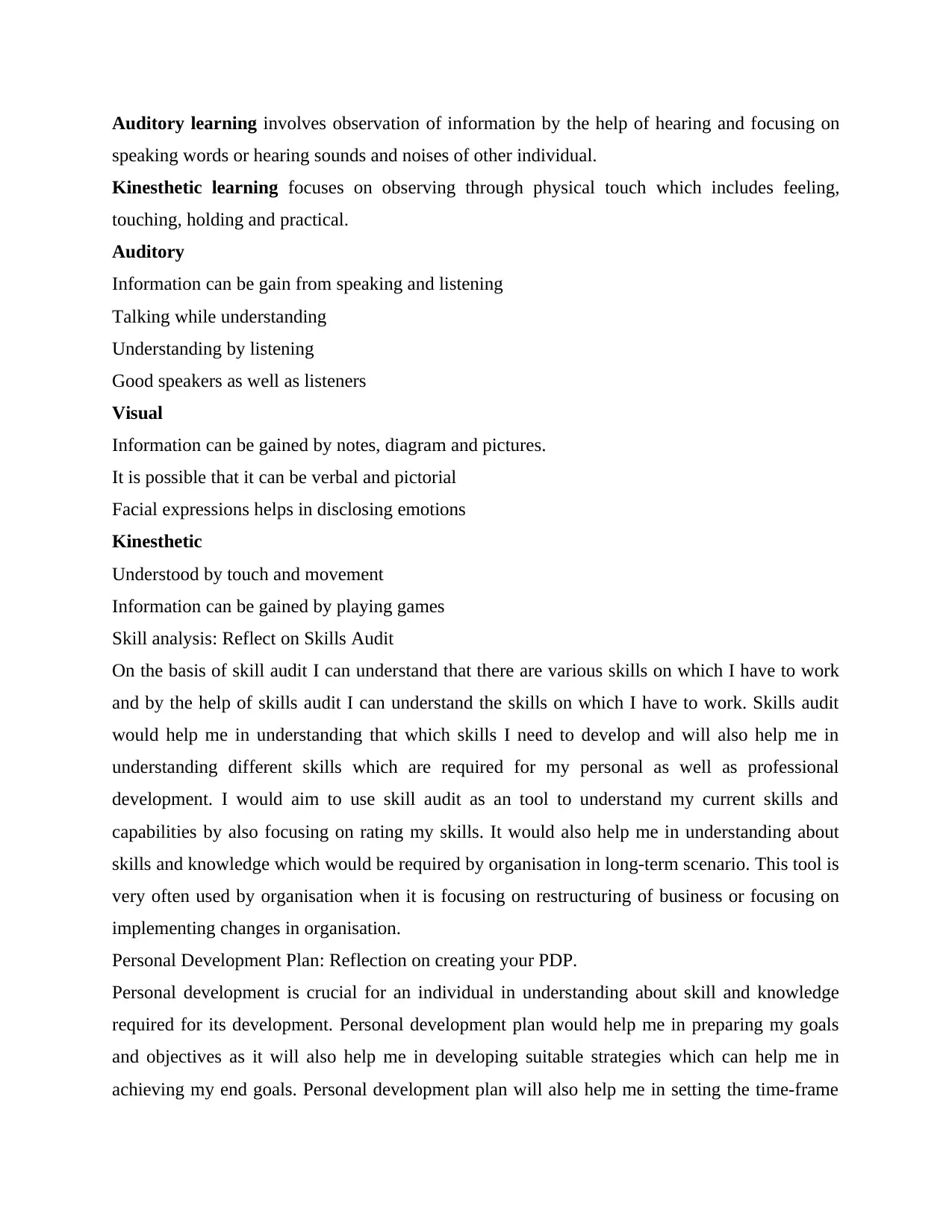
Auditory learning involves observation of information by the help of hearing and focusing on
speaking words or hearing sounds and noises of other individual.
Kinesthetic learning focuses on observing through physical touch which includes feeling,
touching, holding and practical.
Auditory
Information can be gain from speaking and listening
Talking while understanding
Understanding by listening
Good speakers as well as listeners
Visual
Information can be gained by notes, diagram and pictures.
It is possible that it can be verbal and pictorial
Facial expressions helps in disclosing emotions
Kinesthetic
Understood by touch and movement
Information can be gained by playing games
Skill analysis: Reflect on Skills Audit
On the basis of skill audit I can understand that there are various skills on which I have to work
and by the help of skills audit I can understand the skills on which I have to work. Skills audit
would help me in understanding that which skills I need to develop and will also help me in
understanding different skills which are required for my personal as well as professional
development. I would aim to use skill audit as an tool to understand my current skills and
capabilities by also focusing on rating my skills. It would also help me in understanding about
skills and knowledge which would be required by organisation in long-term scenario. This tool is
very often used by organisation when it is focusing on restructuring of business or focusing on
implementing changes in organisation.
Personal Development Plan: Reflection on creating your PDP.
Personal development is crucial for an individual in understanding about skill and knowledge
required for its development. Personal development plan would help me in preparing my goals
and objectives as it will also help me in developing suitable strategies which can help me in
achieving my end goals. Personal development plan will also help me in setting the time-frame
speaking words or hearing sounds and noises of other individual.
Kinesthetic learning focuses on observing through physical touch which includes feeling,
touching, holding and practical.
Auditory
Information can be gain from speaking and listening
Talking while understanding
Understanding by listening
Good speakers as well as listeners
Visual
Information can be gained by notes, diagram and pictures.
It is possible that it can be verbal and pictorial
Facial expressions helps in disclosing emotions
Kinesthetic
Understood by touch and movement
Information can be gained by playing games
Skill analysis: Reflect on Skills Audit
On the basis of skill audit I can understand that there are various skills on which I have to work
and by the help of skills audit I can understand the skills on which I have to work. Skills audit
would help me in understanding that which skills I need to develop and will also help me in
understanding different skills which are required for my personal as well as professional
development. I would aim to use skill audit as an tool to understand my current skills and
capabilities by also focusing on rating my skills. It would also help me in understanding about
skills and knowledge which would be required by organisation in long-term scenario. This tool is
very often used by organisation when it is focusing on restructuring of business or focusing on
implementing changes in organisation.
Personal Development Plan: Reflection on creating your PDP.
Personal development is crucial for an individual in understanding about skill and knowledge
required for its development. Personal development plan would help me in preparing my goals
and objectives as it will also help me in developing suitable strategies which can help me in
achieving my end goals. Personal development plan will also help me in setting the time-frame
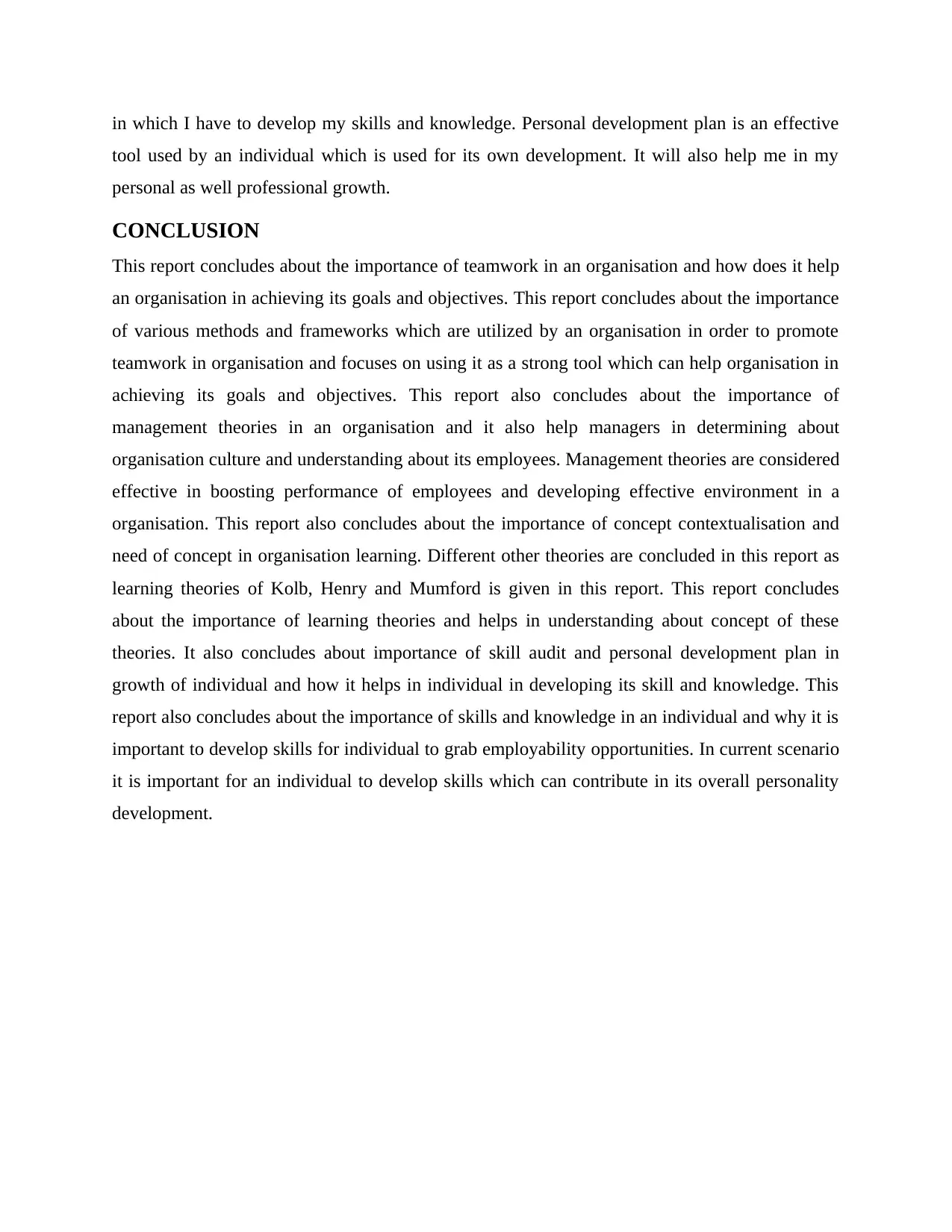
in which I have to develop my skills and knowledge. Personal development plan is an effective
tool used by an individual which is used for its own development. It will also help me in my
personal as well professional growth.
CONCLUSION
This report concludes about the importance of teamwork in an organisation and how does it help
an organisation in achieving its goals and objectives. This report concludes about the importance
of various methods and frameworks which are utilized by an organisation in order to promote
teamwork in organisation and focuses on using it as a strong tool which can help organisation in
achieving its goals and objectives. This report also concludes about the importance of
management theories in an organisation and it also help managers in determining about
organisation culture and understanding about its employees. Management theories are considered
effective in boosting performance of employees and developing effective environment in a
organisation. This report also concludes about the importance of concept contextualisation and
need of concept in organisation learning. Different other theories are concluded in this report as
learning theories of Kolb, Henry and Mumford is given in this report. This report concludes
about the importance of learning theories and helps in understanding about concept of these
theories. It also concludes about importance of skill audit and personal development plan in
growth of individual and how it helps in individual in developing its skill and knowledge. This
report also concludes about the importance of skills and knowledge in an individual and why it is
important to develop skills for individual to grab employability opportunities. In current scenario
it is important for an individual to develop skills which can contribute in its overall personality
development.
tool used by an individual which is used for its own development. It will also help me in my
personal as well professional growth.
CONCLUSION
This report concludes about the importance of teamwork in an organisation and how does it help
an organisation in achieving its goals and objectives. This report concludes about the importance
of various methods and frameworks which are utilized by an organisation in order to promote
teamwork in organisation and focuses on using it as a strong tool which can help organisation in
achieving its goals and objectives. This report also concludes about the importance of
management theories in an organisation and it also help managers in determining about
organisation culture and understanding about its employees. Management theories are considered
effective in boosting performance of employees and developing effective environment in a
organisation. This report also concludes about the importance of concept contextualisation and
need of concept in organisation learning. Different other theories are concluded in this report as
learning theories of Kolb, Henry and Mumford is given in this report. This report concludes
about the importance of learning theories and helps in understanding about concept of these
theories. It also concludes about importance of skill audit and personal development plan in
growth of individual and how it helps in individual in developing its skill and knowledge. This
report also concludes about the importance of skills and knowledge in an individual and why it is
important to develop skills for individual to grab employability opportunities. In current scenario
it is important for an individual to develop skills which can contribute in its overall personality
development.
⊘ This is a preview!⊘
Do you want full access?
Subscribe today to unlock all pages.

Trusted by 1+ million students worldwide
1 out of 14
Related Documents
Your All-in-One AI-Powered Toolkit for Academic Success.
+13062052269
info@desklib.com
Available 24*7 on WhatsApp / Email
![[object Object]](/_next/static/media/star-bottom.7253800d.svg)
Unlock your academic potential
Copyright © 2020–2025 A2Z Services. All Rights Reserved. Developed and managed by ZUCOL.





